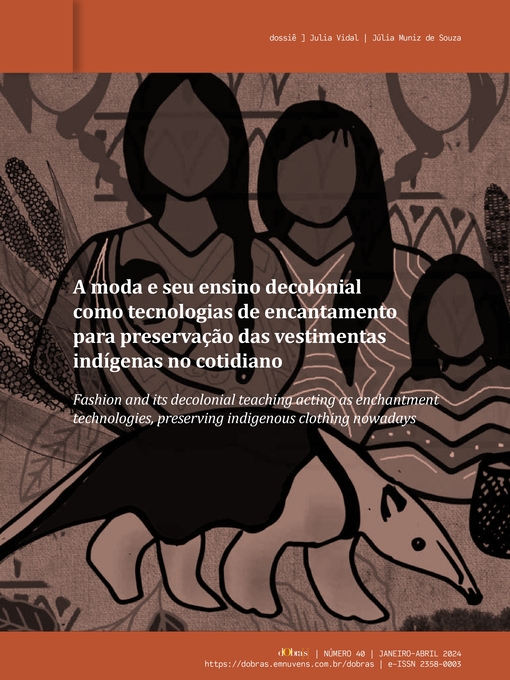A moda e seu ensino decolonial como tecnologias de encantamento para preservação das vestimentas indígenas no cotidiano
DOI:
https://doi.org/10.26563/dobras.i40.1702Palavras-chave:
Moda Indígena, Vestimenta, Cosmovisões, Pluricultural, Escola de-colonialResumo
Este artigo busca ampliar a conceituação da dimensão do vestir abordando as diversas formas de vestimentas indígenas como veículos que perpetuam símbolos, tradições, saberes e identidades, e fazem parte do processo de (re)existência cultural de sociedades que passaram por processos coloniais de genocídio. Como recorte etnográfico abordaremos formas de produção e representação das vestimentas dos povos Marajoara e Xavante, assim como as adaptações necessárias ao contexto urbano em contraposição às construções de significado e sentidos consolidadas nas subjetividades não indígenas, sob a ótica colonizadora. Através da pesquisa bibliográfica, de acervos de imagens, de relatos orais coletados em pesquisa de campo em aldeias e ao longo das aulas do curso de Moda Pluricultural, da Escola Ewà Poranga, pretendemos ampliar a compreensão sobre os vestires originários e do ensino de moda pluricultural como ferramentas decoloniais e antirracistas que fazem parte de um conjunto de ‘tecnologias de encantamento’ para a manutenção das existências das cosmologias indígenas na contemporaneidade.
Downloads
Referências
BARDIN, Laurence. Análise de conteúdo. 6ª ed. São Paulo: Edições 70, 2011.
BARRETO, Cristina. Do teso marajoara ao sambódromo: agência e resistência de objetos arqueológicos da Amazônia. In: Boletim do Museu Paraense Emílio Paraense Emílio Goeldi. Ciências Humanas, Belém, v, 15, n. 3, e. e20190106, 2020. DOI: https://doi.org/10.1590/2178-2547-bgoeldi-2019-0106
BORGES, Luiz C.; GODIM, Lourdes. O saber do mito: Conhecimento e inventividade indígenas. Rio de Janeiro: Editora Teatral, 2003.
COSTA, Márcia O.; Maués, Ivone G. Sons e ritmos africanos na amazônia: O lundu Marajoara. Belo Horizonte; Historiarte, 2016.
DUSSEL, Enrique. Transmodernidade e interculturalidade: interpretação a partir da filosofia da libertação. Revista Sociedade e Estado – Volume 31 Número 1. Janeiro/Abril 2016. DOI: https://doi.org/10.1590/S0102-69922016000100004
D. MIGNOLO, Walter. Desobediência epistêmica: a opção descolonial e o significado de identidade em política. Cadernos de Letras da UFF – Dossiê: Literatura, língua e identidade, no 34, p. 287-324, 2008.
GALLO, Giovanni PE. Motivos Ornamentais da cerâmica Marajoara, modelos para o artesanato de hoje. Cachoeira do Arari: Edições Museu do Marajó, 2005.
GELL, Alfred. The technology of enchantment and the enchantment of technology. In J. Coote & A. Shelton (Eds.), Anthropology, art and aesthetics (pp. 41-63). Oxford: Clarendon Press, 1992. DOI: https://doi.org/10.1093/oso/9780198277330.003.0003
HODDER, I. (1982). Symbols in action: ethnoarchaeological studies of material culture (Série New Studies in Archaeology). Cambridge: Cambridge University Press.
HOSKINS, J. (2006). Agency, biography and objects. In C. Tilley, W. Keane, S. Kuechler, M. Rowlands & P. Spyer (Eds.), Handbook of Material Culture (pp. 74-84). London: Sage Publications. DOI: https://doi.org/10.4135/9781848607972.n6
INDUMENTA. Ixitkydky, Um olhar sobre os trajes tradicionais das mulheres Iny Karajá. Disponível em: vestiresmulheresinykaraja.com. Acesso em: Setembro de 2022. LODY, Raul. Moda e História. As Indumentárias das mulheres de fé. São Paulo; Senac São Paulo, 2015.
MACHADO, José de Paula. Marajó. Rio de Janeiro; Agir, 1989.
PACHAMAMA, Aline Rochedo. Guerreiras = M´baima Miliguapy : Mulheres indígenas na cidade. Rio de Janeiro; Pachamama, 2018.
SCHAAN, Denise P. A linguagem iconográfica da cerâmica marajoara: um estudo da arte pré-histórica na Ilha de Marajó, Brasil (400-13 00AD). Porto Alegre: EdiPUCRS, 1997. (Coleção Arqueologia, 3).
TUFANO, Douglas. A carta de Pero Vaz de Caminha. São Paulo: Editora moderna, 2023. UNIVERSIDAD INTERCULTURAL AMAWATAY WASI. Aprender en Ia Sabiduría y el Buen Vivir. Quito: Imprenta Mariscal. 2004.
VIDAL, Julia (organizadora). Cosmovisões X Moda: Qual é a sua tendência? Contribuições e proposições para uma moda étnica e ética. Rio de Janeiro: Editora Universidade Indígena, 2020.
VIDAL, Julia. Precisamos desconstruir ou construir? a arte utilitária como um caminho de construção. Anais do I Colóquio Design e Memória. Belo Horizonte, MG: Sobrado, 2022.
VIDAL, Lux (organizadora). Grafismo Indígena. Estudos de antropologia estética. São Paulo: Studio Nobel, FAPESP, Editora da Universidade de São Paulo, 2000.

Downloads
Publicado
Como Citar
Edição
Seção
Licença
Copyright (c) 2024 Julia Vidal, Julia Xavante

Este trabalho está licenciado sob uma licença Creative Commons Attribution-NonCommercial-ShareAlike 4.0 International License.
Direitos Autorais para artigos publicados nesta revista são do autor, com direitos de primeira publicação para a revista. Em virtude de aparecerem nesta revista de acesso público, os artigos são de uso gratuito, com atribuições próprias, em aplicações educacionais e não-comerciais








